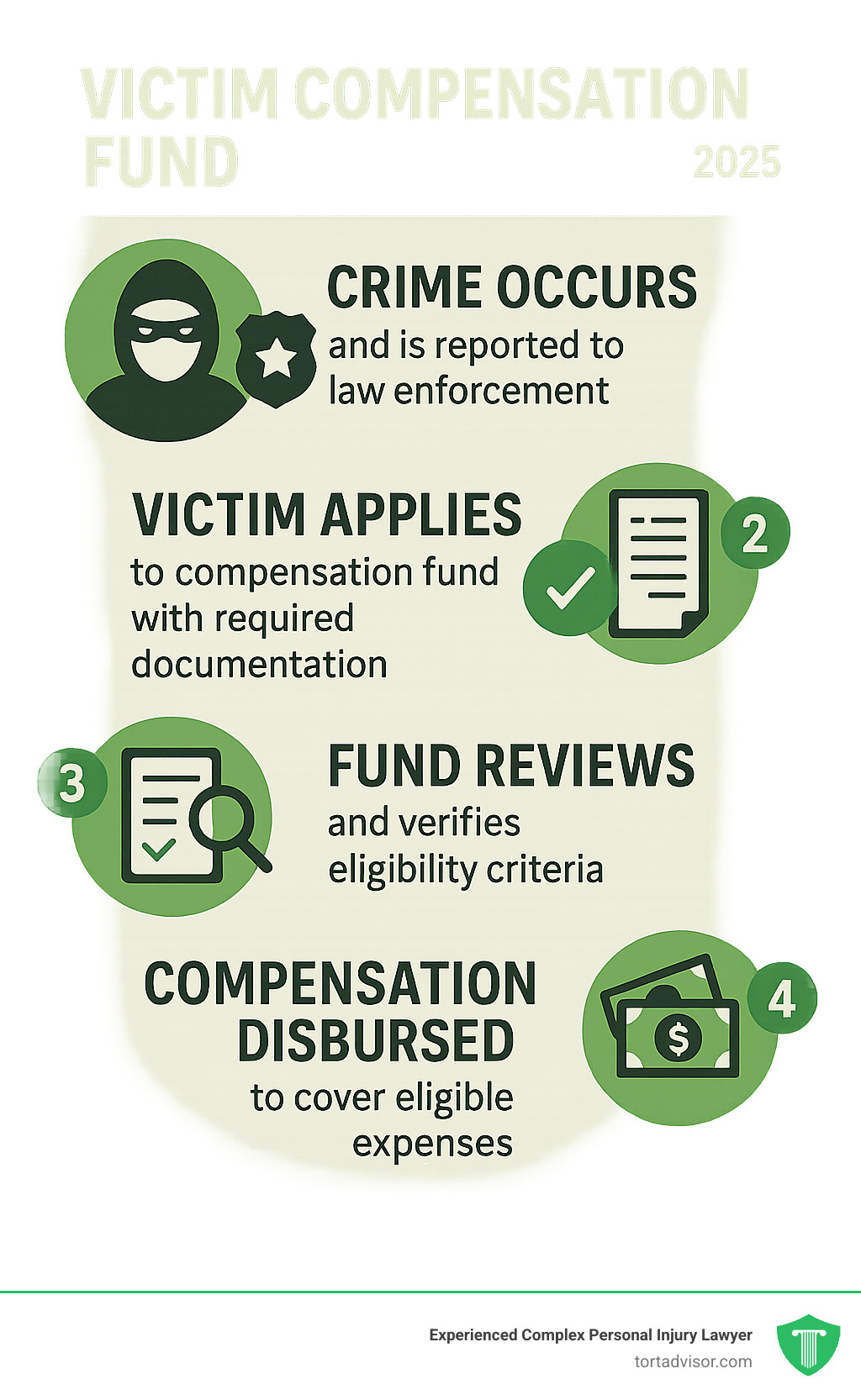


Understanding Your Path to Financial Recovery After Crime
A victim compensation fund is a government-administered program designed to provide financial assistance to individuals who have suffered physical, emotional, or financial harm as a result of violent crimes. These funds serve as a crucial safety net when insurance falls short or when offenders cannot pay restitution.
Key Facts About Victim Compensation Funds:
- Purpose: Cover crime-related expenses like medical bills, lost wages, counseling, and funeral costs
- Funding: Typically financed through offender fees, fines, and government allocations – not taxpayer money
- Eligibility: Generally requires reporting the crime to law enforcement and cooperating with investigations
- Coverage: Acts as “payer of last resort” after insurance and other benefits are exhausted
- Availability: Programs exist at federal, state, and provincial levels across North America
Major Programs Include:
- September 11th Victim Compensation Fund (awarded $14.9 billion to over 65,600 claimants)
- State programs like Texas CVC (up to $50,000 coverage) and Michigan’s Crime Victim Compensation
- Canadian provincial programs administered through Justice Canada’s Victims Fund
The difference between compensation and restitution is important. While restitution comes directly from the offender through court orders, compensation funds provide immediate financial relief regardless of whether the perpetrator is caught or has the ability to pay.
When you’ve been victimized by crime, the financial burden shouldn’t compound your trauma. These funds exist specifically to help you recover and move forward with your life.
Understanding the Basics: Compensation vs. Restitution
When crime strikes, the financial impact can be as devastating as the emotional trauma. Fortunately, two systems exist to help victims recover financially: victim compensation funds and court-ordered restitution. Understanding the difference can mean getting help quickly versus waiting months or years for relief.
What is a Victim Compensation Fund?
A victim compensation fund is a government-run financial safety net for people harmed by violent crimes. These programs provide immediate assistance, regardless of whether the offender is caught or convicted. They operate on a no-fault basis, meaning you don’t need to prove guilt in court. If you are a victim and meet eligibility requirements, help is available.
These funds act as the payer of last resort, stepping in after resources like insurance or disability benefits are used. This ensures all support sources are leveraged while providing a crucial backstop. Funding primarily comes from offender fees and fines, not general taxpayer dollars. Instead, the criminal justice system largely finances them.
General eligibility criteria require you to report the crime to law enforcement within a specific timeframe and cooperate with investigations. Covered expenses are comprehensive, including medical bills, lost wages, mental health counseling, and funeral costs. Many programs also cover crime scene cleanup and relocation expenses.
How is Restitution Different?
Restitution requires the offender to directly pay victims for their losses. It is a court-ordered measure focused on accountability. A court can order restitution for monetary losses from bodily harm, property damage, or psychological trauma. As outlined by Victims’ Rights in Canada; Restitution Orders, this can be a stand-alone order, a condition of probation, or part of a conditional sentence.
The main challenge with restitution is its dependence on the offender’s ability and willingness to pay. Many offenders lack the financial resources to provide meaningful payment.
| Aspect | Victim Compensation Fund | Court-Ordered Restitution |
|---|---|---|
| Money Source | Government programs funded by offender fees, fines, and allocations | Direct payment from the convicted offender |
| Main Goal | Immediate financial relief regardless of offender circumstances | Making offenders accountable for victim losses |
| When Available | After reporting crime and meeting eligibility requirements | Only after conviction and court order |
| What’s Covered | Medical bills, counseling, lost wages, funeral costs, and more | Specific monetary losses from harm or property damage |
| Timing | Available relatively quickly after the crime | Depends on conviction timeline and offender’s payment ability |
| Requirements | No-fault system with basic cooperation needed | Requires proof of offender’s legal responsibility |
This is where victim compensation funds are invaluable. They can provide immediate relief while you pursue restitution through the courts, and the two systems can work together. For victims exploring all avenues for financial recovery, including legal action, you can find more information about Legal Settlements & Compensation to understand your options.
In short, victim compensation funds offer immediate help, while restitution holds offenders accountable. Both are important for your financial recovery after a crime.
A Closer Look at Major Victim Compensation Fund Programs
Victim compensation funds are lifelines for those impacted by crime. These programs exist at federal, state, and provincial levels, each with unique rules and resources. Understanding this patchwork is crucial for finding the right support.
While some victims pursue broader legal remedies through Mass Tort Lawsuit Settlements, these funds offer a more direct path to financial relief.
The September 11th Victim Compensation Fund (VCF): A Landmark Case
The September 11th Victim Compensation Fund (VCF) was a historic federal response to a national tragedy, offering compensation without lengthy court battles. Created by the Air Transportation Safety and System Stabilization Act, it was overseen by Special Master Kenneth Feinberg.
The fund’s eligibility criteria are specific to the 9/11 attacks. Applicants must have been present at a crash site during a specific timeframe and later diagnosed with a related illness. The exposure zones include the World Trade Center area (9/11/01 – 5/30/02), the Pentagon site (9/11/01 – 11/19/01), and the Shanksville, PA site (9/11/01 – 10/3/01).
Covered illnesses include dozens of cancers and serious respiratory diseases, many of which appeared years later, leading to the fund’s reactivation. The claims process begins with registration, which preserves your rights even if you are not currently ill. Since reopening in 2011, the VCF has awarded $14.9 billion to over 65,600 claimants. For current information, visit the Current VCF fund website. The VCF’s structure has influenced other major settlements, like the New York $750,000 Settlement 2023.
State and Provincial Victim Compensation Funds in Action
While the VCF is well-known, state and provincial programs are the daily workhorses of victim compensation.
- Canadian Programs: Justice Canada’s Victims Fund supports organizations and programs rather than making direct payments. It promotes new victim support approaches and access to justice, with recent federal investments of $85.3 million over five years for sexual assault victims’ legal services. Ontario’s Victims’ Justice Fund collects $44-50 million annually from victim fine surcharges to fund programs.
- American State Programs: These often provide direct financial aid. The Texas Crime Victims’ Compensation Program, funded entirely by offender fees, offers up to $50,000 in coverage, plus an additional $25,000 for sexual assault emergency care. You can find details in the Texas Crime Victims’ Compensation Program Overview.
- Michigan’s program, active since 1977, is a payer of last resort with a review process that can take one day to six months and a 30-day appeal window. Learn more at What is Crime Victim Compensation in Michigan?.
- Oregon’s program uses the Workers’ Compensation Fee Schedule for payments and allows child victims’ claims to remain open until their 21st birthday, acknowledging the long-term impact of childhood trauma.
Each victim compensation fund reflects its community’s values, much like legal outcomes vary in cases such as the California $2.3 Million Verdict 2023. Knowing which program applies to you is key to accessing available help.
Navigating the Application and Claims Process
Applying for a victim compensation fund can seem daunting, but with the right preparation, you can steer the process successfully. The steps are generally consistent across most programs.
Understanding what reviewers look for improves your chances of approval. Police reports, medical records linking injuries to the crime, and proof of lost wages are the backbone of a successful claim. Because funds are the “payer of last resort,” you must also show you’ve exhausted other resources by submitting insurance explanations of benefits. Just as in complex legal cases like those discussed in How Much Does Mass Tort Lawsuits Receive?, a well-prepared claim is crucial.
General Steps to Applying for a Victim Compensation Fund
- Determine Eligibility: Each program has unique criteria for covered crimes, victim relationship, and law enforcement cooperation. Check the specific rules for your jurisdiction.
- Locate the Correct Fund: Identify whether a state, provincial, or federal fund (like the 9/11 VCF) applies to your situation.
- Gather Documents: This is the most time-consuming step. You will need police reports, medical records, proof of lost wages, and receipts for other covered costs like counseling or funeral expenses.
- Submit Your Application: Use online portals for faster processing, but mail-in forms are often available. Ensure the application is complete and accurate to avoid delays.
- Cooperate with Requests: Respond promptly if the program asks for additional information or clarification. This keeps your claim moving.
- Await Decision: Review timelines vary from weeks to months. Keep copies of all submitted materials.
The Appeals Process and What to Do if Denied
A denial is not the end. Most victim compensation fund programs have an appeals process, but you must act quickly.
Your right to appeal comes with strict deadlines. For example, Michigan’s program gives you 30 days to file a written appeal, and Texas offers similar rights. Missing these deadlines can be fatal to your claim.
The appeals process allows you to present new evidence or clarify information. Many programs offer administrative hearings where you can present your case to an impartial officer. These are serious proceedings where preparation is key. Persistence and proper documentation often lead to better outcomes, similar to successful personal injury cases like the Verdict: $1.2 Million Settlement for Passenger Injured in a T-Bone Collision. Program administrators want to help eligible victims, so approaching an appeal with a clear, well-documented case is your best strategy.
The Crucial Role of Legal Counsel in Your Claim
Navigating a victim compensation fund claim adds legal complexity to an already traumatic experience. An experienced attorney is essential to managing the process and securing the compensation you deserve.
An attorney can help in several key ways:
- Navigating Complex Rules: Each program has intricate eligibility requirements. A lawyer understands these nuances and can identify the correct fund for your case, avoiding common pitfalls.
- Maximizing Your Compensation: Many victims are unaware of all the expenses they can claim. An attorney ensures you seek reimbursement for everything from medical bills and lost wages to counseling and crime scene cleanup.
- Managing Paperwork: Lawyers efficiently gather necessary evidence like police reports and medical records, allowing you to focus on your recovery. They ensure all forms are filed correctly and on time, preventing denials on technicalities.
- Handling Appeals: If your claim is denied or underpaid, an attorney becomes your advocate, challenging the decision and fighting for a fair outcome.
One critical area for legal advice is understanding waiver implications. Some funds, like the New Jersey Compensation Fund for Survivors of Church Sexual Abuse of Minors, require you to waive your right to sue in exchange for payment. This fund, overseen by administrators Kenneth Feinberg and Camille Biros, offers significant compensation but permanently closes the door on civil litigation.
An attorney can help you weigh the immediate benefit of a fund payment against the potential value of a lawsuit, a complex calculation similar to those in cases like a $5 Million Settlement for Infection Related Injuries.
A victim compensation fund claim is too important to handle alone. Let an experienced attorney manage the legal complexities while you focus on moving forward.
Frequently Asked Questions about Victim Compensation Funds
Here are answers to common questions about victim compensation funds.
What types of crimes typically make someone eligible for compensation?
Most programs cover violent crimes like assault, robbery, domestic violence, sexual assault, and homicide. Many also include drunk driving incidents and, in specific cases like the 9/11 VCF, terrorism. Property crimes are generally not covered unless they involved violence. Eligibility varies by jurisdiction, so always check the rules for your local victim compensation fund.
Are there time limits for applying for victim compensation?
Yes, and deadlines are strict. Most programs require you to apply within one to three years of the crime. Missing this window usually means forfeiting your right to compensation. Exceptions may exist for child victims or for illnesses with long latency periods, where the deadline may be tied to the date of diagnosis. It is critical to apply as soon as possible.
Can I receive compensation if I also have insurance?
Yes, but funds are the “payer of last resort.” You must first file with other sources like health insurance, auto insurance, or disability benefits. The victim compensation fund then covers remaining out-of-pocket costs, such as deductibles, co-pays, and other expenses not covered by your insurance, up to the program’s limits. This process ensures that fund resources are available to help as many victims as possible.
Conclusion
When crime strikes, the financial aftermath can be overwhelming. Victim compensation funds offer a vital lifeline, providing a safety net that is not dependent on the offender’s ability to pay restitution. From major federal programs like the September 11th VCF, which has awarded $14.9 billion, to state-specific systems in Texas and Michigan, these funds are designed to help you recover.
However, the rules vary significantly by location. Whether you are in one of the many states we serve, from Alabama to Wyoming, or in a major city like Chicago or Miami, your local program has specific deadlines, eligibility rules, and covered expenses. Missing a deadline or failing to provide correct documentation can mean losing out on thousands of dollars for medical bills, lost wages, and other costs.
If a claim is denied, the appeals process is your next step, and professional guidance is critical. At Tort Advisor, we connect clients with attorneys who have proven track records in this specialized area. They understand how to steer the intricate world of victim compensation, from filing the initial claim to handling appeals.
You should not have to manage this complex system while trying to heal. Let an experienced attorney fight for the maximum compensation you deserve. Your path to financial recovery starts with taking action.
Get help with your personal injury lawsuit and connect with a lawyer who can guide you through the victim compensation fund process. Your recovery is what matters most.
Free Confidential Case Evaluation
Complete the short form below to get an immediate FREE case review with an expert in your specific claim. Don't wait, your case could be time sensitive to file a claim.
Related Posts
Discover New Jersey disability benefits: TDI, FLI, SSDI, SSI rates, eligibility, applications & appeals for 2025-2026.
Hire a Depo-Provera lawsuit attorney now. Fight Pfizer for meningioma risks from injections. Free consult, MDL updates & settlements up to $1.5M.
Find top Miami florida car accident lawyers after your 305 crash. Get max compensation, navigate no-fault laws & choose the best experts now!
Diagnosed with cancer after Roundup? Learn about the monsanto roundup lawsuits, eligibility criteria, and how to pursue your claim.
Discover how do you qualify for a hair relaxer lawsuit: criteria, diagnoses, evidence & brands in uterine cancer MDL. Claim review now!
Find the best uber sexual assault lawsuit lawyer: expert guides, MDL experience, proven results & nationwide firms for justice.











